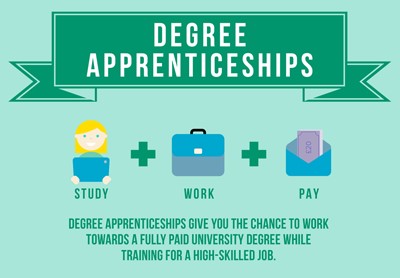'Hands-on Help for SMEs' and Smart Technical People'
Engineering
Degree Apprenticeships
The Best of a University Education and
High Quality Vocational Training
Engineering Degree Apprenticeships - the best of both worlds...
Engineering Degree Apprenticeships offer the combined benefits of a Bachelors (Level 6) or Masters (Level 7) degree, with real-world, high quality on-the-job training. They have been developed with input from academia and business, and are designed to provide the skills organisations badly need, together with the rigorous theory that underpins modern industry. Degree apprenticeships can last anywhere between 1 to 6 years, with those who already possess degrees able to transfer onto them, to acquire the practical skills necessary to boost their employability.
Working full time clearly benefits the employer, with higher levels of output and meaningful skills development. Likewise engineering degree apprenticeships provide the opportunity for on-the-job training and industrial skills development, without the cost (debt) of a traditional university degree – as well as a real wage. Not surprisingly they are proving popular with apprentices and manufacturing and technology businesses. Degree apprenticeships are available in a variety of technical disciplines including…
- Mechanical engineering
- Software engineering
- Electronic and electrical engineering
- Automotive engineering
- Aerospace engineering
- Systems engineering
- As well as nuclear, power, surveying and more
Other technical disciplines exist too, and more are coming online annually. Additionally, management degree apprenticeships are an excellent way to obtain the business and leadership skills small engineering and technology businesses value when growing and expanding.
Degree apprenticeships are designed to appeal to both young people starting out in their careers, as well as more mature individuals who may wish to up-skill or retrain later in their working life. The apprenticeship levy is the ideal way for employees to fund degree apprenticeships. Unlike conventional degrees, the apprentice/student does not incur debt, which makes the scheme an attractive alternative to the traditional engineering degree.
The structure of degree apprenticeships differ, with the taught portion varying in how it is delivered depending on the university or college. Like all (intermediate, advanced and higher) apprenticeships, degree apprenticeships require assessment throughout, with an end-point assessment prior to the award of the qualification. Some schemes are designed around degrees accredited by the professional engineering institutions. This provides a route to professional registration as an Engineering Technician (EngTech), Incorporated Engineer (IEng) or Chartered Engineer (CEng).
Engineering degree apprenticeships are backed by a range of prime manufacturers in a variety of industrial sectors. SMEs in the supply chains of larger firms can benefit by aligning their skills and knowledge, whilst attracting and retaining top technical talent for the long-term too.
Degree apprenticeships are an excellent CPD option for aspiring engineers or for those considering retraining mid-career. They provide SMEs with access to the latest thinking and expertise required for modern manufacturing, now and in the future. Take a look at local university and college websites to see what they offer. National, regional and local manufacturers and technology businesses have been quick to sponsor degree apprenticeships, so they are well worth investigating. Below, you can see a range of short video case studies and gain an insight from both a people and business perspective.
Enjoy!
Mark Lynch
Founder, Advice Manufacturing
Engineering Degree Apprenticeships












